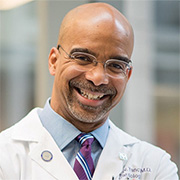The Importance of Uplifting Diversity and Inclusion
The expected beginning of any welcome message penned during the holiday season encompasses greetings of exuberant cheer and merriment with wishes for magical gifts and memorable times. Simply being alive and a few years removed from the pandemic, as well as expecting a navigable winter, would seem sufficient for worthy celebration. And if you are a student, graduate student, allied health student or resident/fellow physician in training, you are another half-year towards your goal. While these are all things worthy of celebration going into the new year, those of us who own the lens of diversity and inclusion may find it difficult to be joyous in the aftermath of the 2023 SCOTUS decision and in this space of national retreat from the diversity and inclusion initiatives we worked so hard to build over the last several years. It gives me pause, and given our perilous, precarious world, one finds it nearly impossible to gaze the other way and feign gaiety.
But in my deeper purview, the work of our Office of Diversity and Inclusion (ODI) may indeed be worthy of celebration. For instance, in certain states, an office such as ours that oversees diversity, equity and inclusion, positions of vice dean, associate dean, assistant dean or director of any programmatic effort focused on diversity and inclusion or any iteration of diversity, equity and inclusion (DEI) is illegal. We should not devalue the privilege of voice and the license of advocacy. We should embrace a definition of diversity that goes beyond race and ethnicity and hold steadfast diversity and inclusion as pathways towards excellence. Our voices are not meek; we soar in our conviction. We recognize and unhesitatingly acquiesce to the 2023 SCOTUS decision ending affirmative action in higher education, and accordingly, we will continue to accommodate all students and established life science professionals in our community. This is as it should be. Diversity of thought and inclusivity of participation guide our path forward in advocacy for and attainment of health equity. Everyone is welcome in our office. In fact, we need everyone, and your help is necessary as we will never be at our best in society if we don’t pursue the best science, elevate health, and optimize healthcare throughout the entirety of the populations we serve. Consider this an inviolate truth. The journey to attain health equity may have started as a moral march, but it is now an economic essential. We have work to do. Indeed, the work of health equity is essential, and if done successfully, celebratory.
Recognize this: At this fractious moment in our world, it is appropriate for us to seek out and then offer support to each other throughout our diverse community. While it’s difficult to know exactly what to say to those who are hurting and aggrieved, we all know how to care. And although our safe space is couched in the ethics of our varied professions in tense moments, our ethical convictions will guide us much like they informed our path forward from the dark torment of the pandemic into a new, though still murky, dawn. The four principles of ethics are resolute: beneficence—do good for others; non-maleficent—do no harm; autonomy—giving voice to others; and justice—doing the right thing. This greater sense of ethics rises above politics and is in keeping with our ethos—that ancient Greek word meaning “character.” In this crucible chapter of contemporary history, it is worth acknowledgment, perhaps even worth celebrating, that we need not be subsumed by emotions and rhetoric but rather be emboldened by character.
Applaud this: ODI has developed new programs and resources for students and faculty from diverse backgrounds, and for the first time ever, created a capital campaign goal of $10 million for scholarships for FSM students where need is determined based on qualified student’s personal journeys of resilience and perseverance. Imagine a Northwestern University Feinberg School of Medicine with more scholarships that help usher in new science, new voices and new leaders—precisely the assets we need in our inexhaustible quest for health equity. And that is worth celebrating, even if all we celebrate is the audacity to try.
Although we are just beginning, we are uplifted by early support from Feinberg faculty and alums, friends of Northwestern and grateful patients. Learn more about the rich 20-year existence of ODI in John Franklin’s tribute below. The journey has been long, and the path at times difficult, but the outcomes are notable and, most importantly, the work continues.
What I share with you is not timely for a holiday season, but timeless for our era. Events today shape health, healthcare, and health equity tomorrow. Hold solace that we are fully participatory and hold hope that we will lead equipped with the gifts of insight, judgment, character, and especially, ethics.
Indeed, we should celebrate.

Clyde W. Yancy, MD, MSc, Vice Dean of Diversity and Inclusion